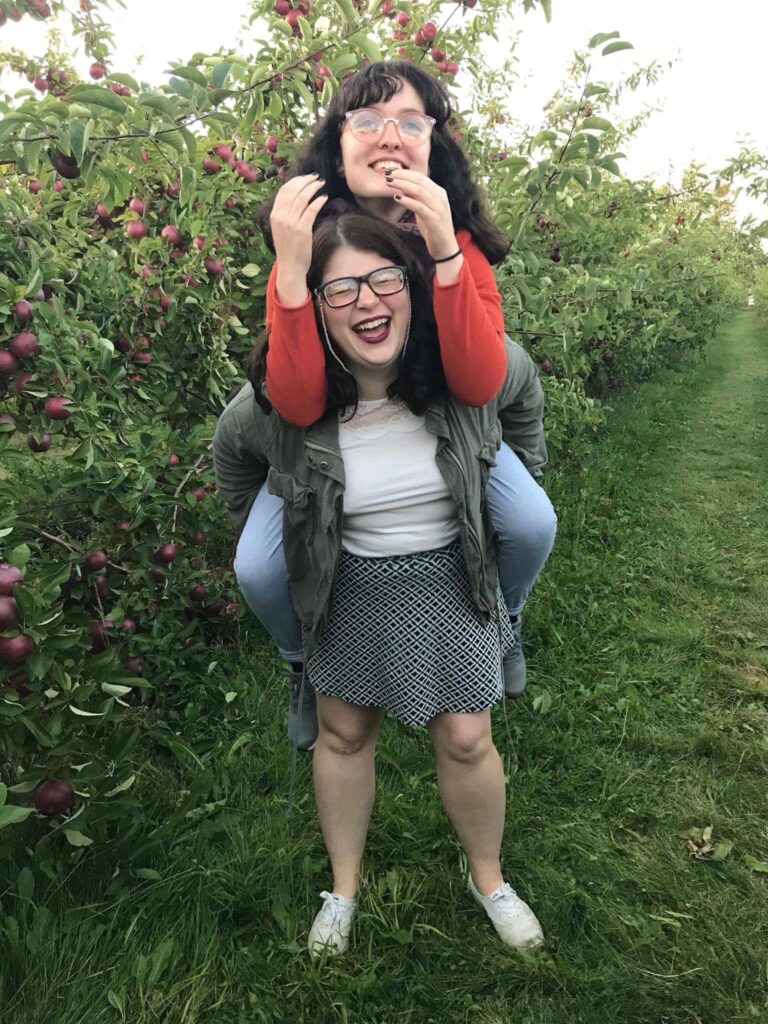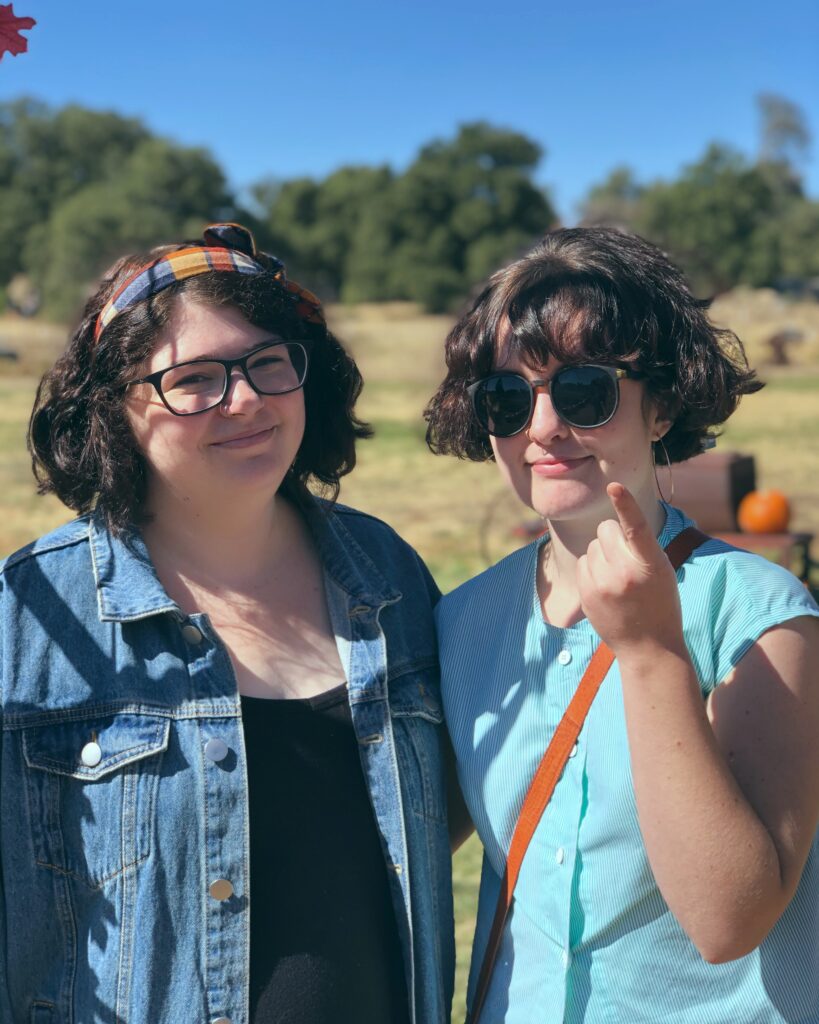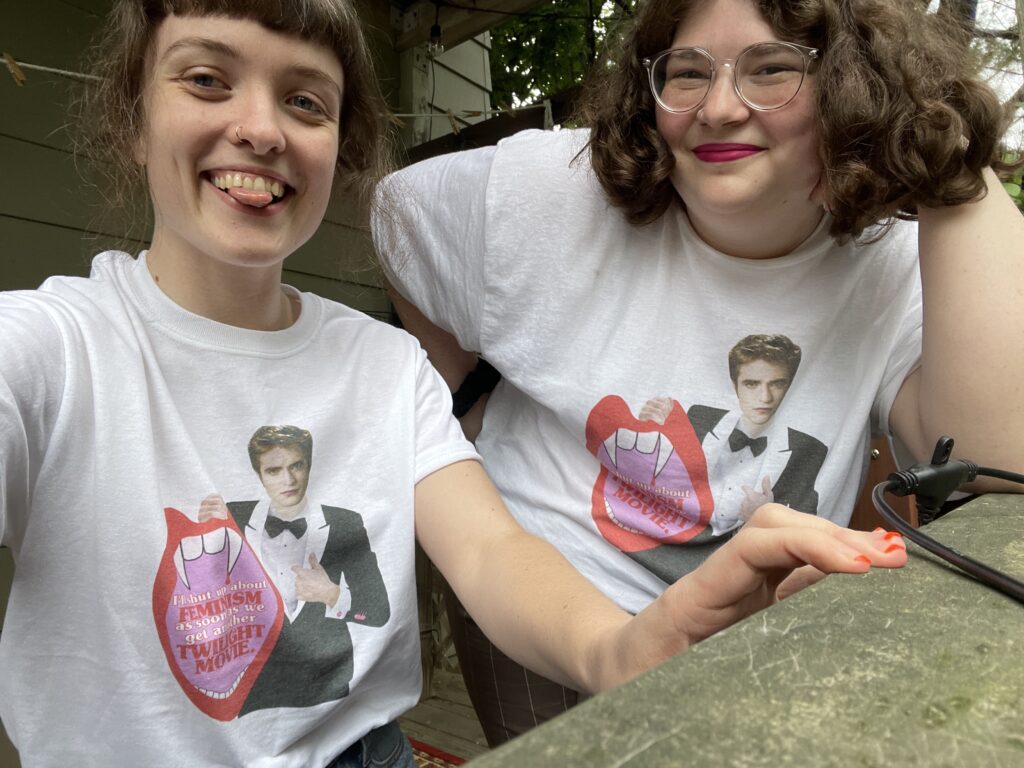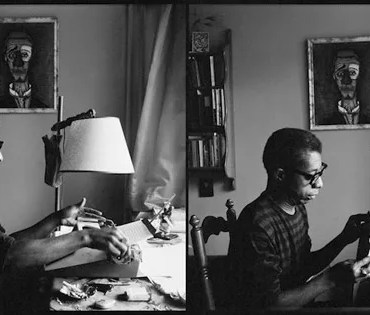Terri is co-founder, webmaster, and editor of The Hyacinth Review.…
For our first-ever interview at The Hyacinth Review, I’m pleased to introduce Lori and Sam, two Twilight enthusiasts/best friends/sex educators and the creators of Gender Forking, a podcast that examines the Twilight saga through a lens of gender, sexuality, race, and fandom.
When I first reached out to them about this interview I had yet to read the Twilight series, but their infectious enthusiasm encouraged me to pick it up and I’ve since binged it in its entirety.
Whether you’re a Twilight fan, hater, or undecided, Gender Forking is an entertaining, enlightening podcast run by two hilarious and intelligent individuals, and I can think of no better start to our interview series.
Enjoy!
First of all, I love your podcast. I’m not usually a podcast person as I find it hard to connect to them and immerse myself, but your show gives off a feeling of being part of a slumber party; I, as the listener, feel like I’m there with you, and we’re all having fun. Was this an intention that you set out with when you started Gender Forking, or was it something that happened organically?
It was definitely not intentional. We had the idea to start a Twilight podcast but we didn’t even know that we wanted to do any kind of social critique until we bought a copy of Life and Death, read the first few pages, and immediately took huge issue with the entire premise. Then, the intention became to emulate a feminist book club or class. We knew we wanted to be academic-adjacent because we had just graduated from the same women’s, gender and sexuality studies program. We were always talking about feminism, and we were always talking about Twilight. Picking up that copy of Life and Death showed us how we could put those two things together and create something that offered a different lens than other Twilight podcasts that were already out at the time.
We didn’t realize that people were listening to us because they thought we were funny until after the first season aired. Now several seasons in, we definitely lean more into the slumber party vibe. It seems like people enjoy the podcast because they enjoy listening to us talk to each other, which sounds obvious but it was kind of unexpected for us. We’re best friends and our dynamic ended up naturally setting the tone for the podcast.
For those who haven’t tuned in to Gender Forking yet, can you tell us a bit about yourselves, how you met, & what made you decide to start a podcast together?
Sam
We met in college, about 7 years ago! We were involved in a lot of the same programs and clubs and ended up doing quite a bit of activism together during that time. Twilight has always been a part of our relationship. In fact, the first time we hung out was to watch Twilight together.
Lori
On the first day we hung out outside of school, (August 25th, 2016) we roasted a summer squash and watched Twilight. From my diary: “I cooked the summer squash yesterday. Sam Saucier came over and we roasted it. …I went over to Sam and [Sam’s ex]’s last night after to watch Twilight and meet their cat. I really like Sam, and [ex] is okay too.”
(Both)
We were constantly talking about Twilight with each other and even reading it out loud to each other. We were forcing everyone around us to talk about it with us and watch it with us. We felt like we had created a micro-renaissance for Twilight for ourselves and then in our college community. It got to the point where people around us were engaging in it without us and we would hear about it after. We felt like we needed somewhere to put all of our many thoughts. When we were still in undergrad, we considered hosting a radio show about Twilight through the college radio program, but we never got around to it before graduating. We can’t remember exactly how that idea turned into a podcast, but it was a natural next step. It has been successful in putting a container around Twilight in our lives because we try to save everything for the podcast.
We needed a project, and we also love pranks. The podcast felt like a little bit of a prank, and sometimes still feels like a years-long bit that we’ve committed to.
Since then we have lived parallel lives. If you saw our resumes, you would laugh at how similar they are. (Fitting because people used to get us mixed up in college.) Sam currently works in sexual violence prevention and advocacy, and Lori in domestic violence prevention and advocacy. We both have black cats named after literary figures.


Were you always fans of vampire media, or was Twilight the beginning?
Twilight was the beginning for both of us because we both got into it when we were quite young – around 13. Twilight definitely began our interest in vampire media – an interest that has only grown!
Vampire media has maintained a steady popularity for decades, but there are many elements of Twilight that take inspiration from other genres. In your opinion, what do you consider to be the direct literary predecessor to Twilight?
It doesn’t feel like there is a direct predecessor since Stephenie Meyer has admitted to not having read many vampire classics, such as Dracula or Anne Rice’s novels. At the time, Twilight was relatively unique within the sphere of YA literature, as well. Meyer talks about her inspiration for Twilight coming directly from a dream she had. In many ways, the fantastical randomness of Twilight (particularly in its lack of lore and world-building) feels like it came straight from a dream, rather than the world we live in. It feels more like a rejection (and, often, a sanitization) of vampire canon, even though there are many classic vampire tropes present in the books.
Her claimed literary influences are names like Austen, Brontë, and Shakespeare. Twilight certainly emulates high romance (Bella is always comparing Edward to classic romantic heroes). That being said, the magical scope of Twilight directly followed the successes of J.K. Rowling, so perhaps it’s fair to say Harry Potter is a predecessor.
As someone who had never actually read the Twilight series, Gender Forking made me see it in a new light and I’ve since binged the entire series. Did you expect to have any listeners who had little to no knowledge of Twilight?
Not at all! We are still perplexed that people who haven’t read Twilight listen to the podcast. Not because there’s nothing to offer them, but because our podcast is so incredibly niche. We’re talking about a very specific aspect of subculture using a very specific lens. We are so glad to hear that people who haven’t read it can still enjoy listening!
We’re living in a time where more people than ever – especially younger generations – are thinking critically about the media that they consume. How has looking at the Twilight series through a more critical eye changed your perspective of it?
There used to be some level of benefit of the doubt that Twilight wasn’t as overtly racist and problematic as it is. Thinking about it critically makes very clear the connection between author and work. You read this book and you get to know who Stephenie Meyer is and what she believes. You can’t read all fiction that way, but in Twilight the underlying ideology is laid bare over and over again.
What would you consider key questions to ask when critically examining a piece of media?
Who created this and how does their ideology and lived experience show up in their work? Who benefits from this project? How did this influence culture? What was the intent and impact of this? What ideas or perspectives does this story perpetuate or subvert? What potential harm could this narrative cause? Who benefits from this narrative? Who is represented (and how) and who is missing?
Gender Forking kicks off with a deep dive into Stephenie Meyer’s Life and Death which, for those who are unfamiliar, is a gender-swapped retelling of the first book in the Twilight series. You point out that the concept of gender-swapping – especially in this particular story – often sticks to a male/female cisgender binary and features heterosexual romantic relationships. What would your personal ideal Twilight gender-swap be like?
Everyone is gay and/or trans without rhyme or reason, rather than reinforcing binaries. Also, better creativity in names. If you’re going to genderbend, it shouldn’t be to try to prove a point that gender doesn’t matter or doesn’t impact people’s experiences because it does. Messing with gender or other identity elements in a story should seek to interrogate those gendered/ideological elements.
If you could ask any character in the Twilight series one question, who would it be and what would you ask them?
Lori
I would want to ask Emmett about his family and human life. We don’t get as much detail about him as we do others.
Sam
All I can think is that I simply want to ask Edward, “why?”. If I ask him “why?” multiple times, does that still count as one question? Because that’s what I want to do.
Favorite Twilight character & why?
We have love/hate relationships with most people in the Saga, so this is a hard one.
Lori
Rosalie is definitely a favorite. She’s the only person that doesn’t just bend to Edward’s will on what the family should do. She challenges his place in the family. Her backstory is fascinating, and her motivations are complex, and I think if she existed in another story written by an author that didn’t clearly hate her (and all blondes?) she would really shine.
Sam
I think mine is Bella (probably always has been!). After having re-read through almost the whole series, I know what it’s like to have another narrator for the story and I always end up missing Bella when she’s not there (especially because Edward & Jacob’s narrations are so often insufferable). Bella’s energy is a key contributor to Twilight’s overall vibes.
Least liked or most hated Twilight character & why?
Lori
Aro. I think he’s a boring villain. He’s not very dynamic and he doesn’t have a compelling motivation. Him being the big bad is not very fulfilling. He feels like an arbitrary figurehead of an under-developed group of people. Also, fuck cops.
Sam
Jasper. Meyer really went off the deep end with him. His confederacy background goes totally unchecked and it makes it hard to find redeemable qualities, especially when he uses his powers in questionable ways. I find him interesting, though, and I wish there was more written about his morals/ethics.
What advice would you give someone who is interested in starting a podcast?
For us, it was helpful to create a show structure. For example, we go into each recording session having specific material to work off of and we get to return to the same structure/segments. It’s helpful to pick a structure that works for you. Making a podcast can be a lot of work and is very time consuming. We go at a pace that feels best for us without worrying about meeting arbitrary deadlines or goals (we have never and will never release a weekly episode). We’re just focused on having fun and creating something we like. We talk about serious stuff, but we don’t take it too seriously.
Know your niche. We know we’re not everyone’s Twilight podcast. It wouldn’t feel comfortable trying to be less critical in order to capture a wider audience. Be authentic within your niche because this will help play to your natural strengths.

Finally, what media/music/miscellany have you been loving lately? Twilight-related or otherwise!
Lori
I’ve been reading Payback’s A Witch by Lana Harper, Emma by Jane Austen, and I just finished reading Dracula for the first time through Dracula Daily. 2022 was the year I started to appreciate Taylor Swift’s Folklore and Evermore, which I did not initially vibe with when they were released. And that’s going to be the least embarrassing part of my Spotify wrapped this year. I genuinely feel like the peak of television right now is Sister Wives–if you aren’t watching it by now, the time to start was literally 10 years ago. #TeamChristine. Any show on Dropout (College Humor’s streaming service) is great, but especially A Court of Fey and Flowers, Game Changer, and Make Some Noise. I’ve been watching The Vampire Diaries very slowly for like five years, and I’m in season 6. As you can see, I have little capacity for bummers, so most of the stuff I watch and read is pretty light. I also knit a lot! The only podcast I listen to consistently is called The Empty Bowl. It’s a meditative podcast about cereal, and if I could only engage with one piece of media for the rest of my life, that would be it.
Sam
Lately I’ve been listening to a lot of Stereolab and Wednesday. I’m enjoying Miles Bonsignore’s new podcast, Perfect Person. I recently read and loved This Is How You Lose the Time War by Max Gladstone and Amal El-Mohtar. I’m reading All About Love by bell hooks, which is incredible. The new Interview With A Vampire series is amazing – a great example of how vampire media can meaningfully explore race and sexuality.
We both love What We Do in the Shadows and Our Flag Means Death. We spend a lot of our free time baking, especially Claire Saffitz recipes.
You can find Sam & Lori via the following:











